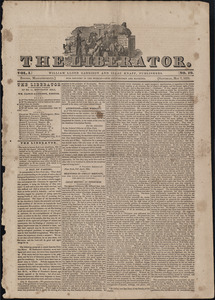Boston Public Library
Anti-Slavery (Collection of Distinction)

Detail from:
Shall freedom or slavery triumph
In the late 1890s, the family of William Lloyd Garrison, along with others closely involved in the anti-slavery movement, presented Boston Public Library with a major gathering of correspondence, documents, and other original material relating to the abolitionist cause from 1832 until after the American Civil War.
The Anti-Slavery Collection contains about 40,000 pieces of correspondence, broadsides, newspapers, pamphlets, books, and realia spanning a 35-year period. The major holdings consist of the papers of William Lloyd Garrison, Maria Weston Chapman and Deborah Weston, Lydia Maria Child, Amos Augustus Phelps, and Samuel May Jr.; records of the American, Massachusetts, New England, and Female Anti-Slavery Societies; and the libraries of William Lloyd Garrison, Theodore Parker, and Wendell Phillips.
Along with the well-known and influential American abolitionists, there is a substantial amount of correspondence from British and Irish abolitionists such as John Bishop Estlin, Harriett Martineau, and Richard and Hannah Webb, who did much to promote the cause both in their respective countries and in the United States.
The collection includes a full run of William Lloyd Garrison's "The Liberator," a newspaper that was published continuously for 35 years, from 1831 to 1866. This newspaper, published by Garrison, was the official organ of the abolitionist movement.
Critical funding to support long-term preservation of and enhanced public access to Boston Public Library collections, including this one, was provided by the Associates of the Boston Public Library.
The Anti-Slavery Collection contains about 40,000 pieces of correspondence, broadsides, newspapers, pamphlets, books, and realia spanning a 35-year period. The major holdings consist of the papers of William Lloyd Garrison, Maria Weston Chapman and Deborah Weston, Lydia Maria Child, Amos Augustus Phelps, and Samuel May Jr.; records of the American, Massachusetts, New England, and Female Anti-Slavery Societies; and the libraries of William Lloyd Garrison, Theodore Parker, and Wendell Phillips.
Along with the well-known and influential American abolitionists, there is a substantial amount of correspondence from British and Irish abolitionists such as John Bishop Estlin, Harriett Martineau, and Richard and Hannah Webb, who did much to promote the cause both in their respective countries and in the United States.
The collection includes a full run of William Lloyd Garrison's "The Liberator," a newspaper that was published continuously for 35 years, from 1831 to 1866. This newspaper, published by Garrison, was the official organ of the abolitionist movement.
Critical funding to support long-term preservation of and enhanced public access to Boston Public Library collections, including this one, was provided by the Associates of the Boston Public Library.



































